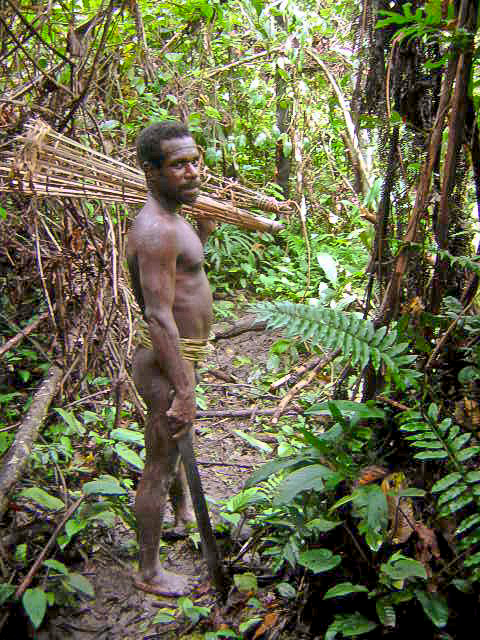|
The World Until Yesterday
''The World Until Yesterday: What Can We Learn from Traditional Societies?'' is a 2012 popular science book by Jared Diamond. It explores what people living in the Western world can learn from traditional societies, including differing approaches to conflict resolution, treatment of the elderly, childcare, the benefits of multilingualism and a lower salt intake. Reception ''The World Until Yesterday'' has had a mixed reception. Abby O'Reilly of ''The Independent'' called it "essential reading" that "cements iamond'sposition as the most considered, courageous and sensitive teller of the human story writing today." In ''The New York Times'', David Brooks' review was mostly positive; but he lamented the lack of individual indigenous voices in the book, calling it "curiously impersonal." Anthropologists' reception of the book was less positive. Ethnobotanist Wade Davis said both the scope of the "lessons" drawn and the range of ethnographic evidence used to support them was l ... [...More Info...] [...Related Items...] OR: [Wikipedia] [Google] [Baidu] |
Jared Diamond
Jared Mason Diamond (born September 10, 1937) is an American scientist, historian, and author. In 1985 he received a MacArthur Genius Grant, and he has written hundreds of scientific and popular articles and books. His best known is '' Guns, Germs, and Steel'' (1997), which received multiple awards including the 1998 Pulitzer Prize for general nonfiction. In 2005, Diamond was ranked ninth on a poll by '' Prospect'' and ''Foreign Policy'' of the world's top 100 public intellectuals. Originally trained in biochemistry and physiology, Diamond has published in many fields, including anthropology, ecology, geography, and evolutionary biology. In 1999, he received the National Medal of Science, an honor bestowed by the President of the United States and the National Science Foundation. He was a professor of geography at UCLA until his retirement in 2024. Early life and education Diamond was born on September 10, 1937 in Boston, Massachusetts. His parents were both Eastern Europ ... [...More Info...] [...Related Items...] OR: [Wikipedia] [Google] [Baidu] |
The New York Times
''The New York Times'' (''NYT'') is an American daily newspaper based in New York City. ''The New York Times'' covers domestic, national, and international news, and publishes opinion pieces, investigative reports, and reviews. As one of the longest-running newspapers in the United States, the ''Times'' serves as one of the country's Newspaper of record, newspapers of record. , ''The New York Times'' had 9.13 million total and 8.83 million online subscribers, both by significant margins the List of newspapers in the United States, highest numbers for any newspaper in the United States; the total also included 296,330 print subscribers, making the ''Times'' the second-largest newspaper by print circulation in the United States, following ''The Wall Street Journal'', also based in New York City. ''The New York Times'' is published by the New York Times Company; since 1896, the company has been chaired by the Ochs-Sulzberger family, whose current chairman and the paper's publ ... [...More Info...] [...Related Items...] OR: [Wikipedia] [Google] [Baidu] |
2012 Non-fiction Books
1 (one, unit, unity) is a number, numeral, and glyph. It is the first and smallest positive integer of the infinite sequence of natural numbers. This fundamental property has led to its unique uses in other fields, ranging from science to sports, where it commonly denotes the first, leading, or top thing in a group. 1 is the unit of counting or measurement, a determiner for singular nouns, and a gender-neutral pronoun. Historically, the representation of 1 evolved from ancient Sumerian and Babylonian symbols to the modern Arabic numeral. In mathematics, 1 is the multiplicative identity, meaning that any number multiplied by 1 equals the same number. 1 is by convention not considered a prime number. In digital technology, 1 represents the "on" state in binary code, the foundation of computing. Philosophically, 1 symbolizes the ultimate reality or source of existence in various traditions. In mathematics The number 1 is the first natural number after 0. Each natural numb ... [...More Info...] [...Related Items...] OR: [Wikipedia] [Google] [Baidu] |
Survival International
Survival International is a human rights organisation formed in 1969, a London based charity that campaigns for the collective rights of Indigenous, tribal and uncontacted peoples. The organisation's campaigns generally focus on tribal peoples' desires to keep their ancestral lands. Survival International calls these peoples socially vulnerable, and aims to eradicate what it calls 'misconceptions' used to justify violations of human rights. It also aims to publicize harm caused to tribes by corporations and governments. Survival International states that it aims to help foster tribal people's self-determination. Survival International is in association with the United Nations Department of Global Communications and in consultative status with the UN Economic and Social Council. To ensure freedom of action, Survival accepts no government funding. It is a founding member and a signatory organization of the ''Accountability Charter'' ( INGO Accountability Charter). Survival ha ... [...More Info...] [...Related Items...] OR: [Wikipedia] [Google] [Baidu] |
West Papua (region)
Western New Guinea, also known as Papua, Indonesian New Guinea, and Indonesian Papua, is the western half of the island of New Guinea, formerly Dutch and granted to Indonesia in 1962. Given the island is alternatively named Papua, the region is also called West Papua (). It is one of the seven geographical units of Indonesia in ISO 3166-2:ID. Lying to the west of Papua New Guinea and geographically a part of the Australian continent, the territory is almost entirely in the Southern Hemisphere and includes the Biak and Raja Ampat archipelagoes. The region is predominantly covered with rainforest where traditional peoples live, including the Dani of the Baliem Valley. A large proportion of the population live in or near coastal areas. The largest city is Jayapura. The island of New Guinea has been populated for tens of thousands of years. European traders began frequenting the region around the late 16th century due to spice trade. In the end, the Dutch Empire emerge ... [...More Info...] [...Related Items...] OR: [Wikipedia] [Google] [Baidu] |
Ethnographic
Ethnography is a branch of anthropology and the systematic study of individual cultures. It explores cultural phenomena from the point of view of the subject of the study. Ethnography is also a type of social research that involves examining the behavior of the participants in a given social situation and understanding the group members' own interpretation of such behavior. As a form of inquiry, ethnography relies heavily on participant observation, where the researcher participates in the setting or with the people being studied, at least in some marginal role, and seeking to document, in detail, patterns of social interaction and the perspectives of participants, and to understand these in their local contexts. It had its origin in social and cultural anthropology in the early twentieth century, but has, since then, spread to other social science disciplines, notably sociology. Ethnographers mainly use qualitative methods, though they may also include quantitative data. T ... [...More Info...] [...Related Items...] OR: [Wikipedia] [Google] [Baidu] |
Wade Davis (anthropologist)
Edmund Wade Davis (born December 14, 1953) is a Canadian cultural anthropology, cultural anthropologist, ethnobotany, ethnobotanist, photographer, and writer. Davis came to prominence with his 1985 best-selling book ''The Serpent and the Rainbow (book), The Serpent and the Rainbow'' about the zombies of Haiti. He is professor of anthropology and the BC Leadership Chair in Cultures and Ecosystems at Risk at the University of British Columbia. Early life, family, and education Davis was born in West Vancouver, British Columbia, Canada. He holds degrees in anthropology and biology, and earned his Ph.D. in ethnobotany, all from Harvard University. In 1974, at age 20, Davis crossed the Darién Gap on foot in the company of the English author and amateur explorer Sebastian Snow. Career Beyond his scientific career, Davis is also an active writer, photographer, and filmmaker. He is a licensed river guide and has worked as a park ranger and forestry engineer. Anthropology and ethnobo ... [...More Info...] [...Related Items...] OR: [Wikipedia] [Google] [Baidu] |
Ethnobotanist
Ethnobotany is an interdisciplinary field at the interface of natural and social sciences that studies the relationships between humans and plants. It focuses on traditional knowledge of how plants are used, managed, and perceived in human societies. Ethnobotany integrates knowledge from botany, anthropology, ecology, and chemistry to study plant-related customs across cultures. Researchers in this field document and analyze how different societies use local flora for various purposes, including medicine, food, religious use, intoxicants, building materials, fuels and clothing. Richard Evans Schultes, often referred to as the "father of ethnobotany", provided an early definition of the discipline: Since Schultes' time, ethnobotany has evolved from primarily documenting traditional plant knowledge to applying this information in modern contexts, particularly in pharmaceutical development. The field now addresses complex issues such as intellectual property rights and equitable ben ... [...More Info...] [...Related Items...] OR: [Wikipedia] [Google] [Baidu] |
David Brooks (commentator)
David Brooks (born August 11, 1961) is a Canadian-born American book author and political and cultural commentator. Though he describes himself as an ideological moderate, others have characterised him as centrist, moderate conservative, or conservative, based on his record as contributor to the PBS NewsHour, and as opinion columnist for ''The New York Times''. In addition to his Long-form journalism, shorter form writing, Brooks has authored six non-fiction books since 2000, two appearing from Simon and Schuster, and four from Random House, the latter including ''The Social Animal (Brooks book) , The Social Animal: The Hidden Sources of Love, Character, and Achievement'' (2011), and ''The Road to Character'' (2015). Beginning as a police reporter in City News Bureau of Chicago, Chicago and as an intern at William F. Buckley's ''National Review'', Brooks rose to his positions at ''The New York Times'', NPR, and PBS after a long series of other journalistic positions (film criti ... [...More Info...] [...Related Items...] OR: [Wikipedia] [Google] [Baidu] |
The Independent
''The Independent'' is a British online newspaper. It was established in 1986 as a national morning printed paper. Nicknamed the ''Indy'', it began as a broadsheet and changed to tabloid format in 2003. The last printed edition was published on Saturday 26 March 2016, leaving only the online edition. The daily edition was named National Newspaper of the Year at the 2004 British Press Awards. ''The Independent'' won the Brand of the Year Award in The Drum Awards for Online Media 2023. History 1980s Launched in 1986, the first issue of ''The Independent'' was published on 7 October in broadsheet format.Dennis Griffiths (ed.) ''The Encyclopedia of the British Press, 1422–1992'', London & Basingstoke: Macmillan, 1992, p. 330. It was produced by Newspaper Publishing plc and created by Andreas Whittam Smith, Stephen Glover and Matthew Symonds. All three partners were former journalists at ''The Daily Telegraph'' who had left the paper towards the end of Lord Hartwell' ... [...More Info...] [...Related Items...] OR: [Wikipedia] [Google] [Baidu] |
Traditional Society
In sociology, traditional society refers to a society characterized by an orientation to the past, not the future, with a predominant role for custom and habit. Such societies are marked by a lack of distinction between family and business, with the division of labor influenced primarily by age, gender, and status. Traditional and modern Traditional society has often been contrasted with modern industrial society, with figures like Durkheim and Pierre Bourdieu stressing such polarities as community vs. society or mechanical vs. organic solidarity; while Claude Lévi-Strauss saw traditional societies as 'cold' societies in that they refused to allow the historical process to define their social sense of legitimacy. Within modernisation theory, traditional society is also the first stage of economic development as established in W.W. Rostow's Economic Growth Model. Classified as "pre-newtonian," science and technology are not practiced. Life is agrarian, and family or clan relati ... [...More Info...] [...Related Items...] OR: [Wikipedia] [Google] [Baidu] |



